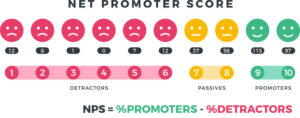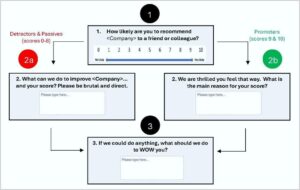The Power of Your Net Promoter Score in Driving Business Growth
Posted: March 20, 2024


In today’s competitive business landscape, the importance of customer satisfaction cannot be overstated; it is a critical factor that can make or break your company. Happy customers are more likely to become loyal patrons, refer others, and contribute to your bottom line. But how do you measure customer satisfaction? One very effective way is the Net Promoter Score® (NPS®) – a powerful metric that provides actionable insights for business owners.
In this article, we explore the crucial role of customer satisfaction and delve into the benefits of tracking your NPS as a valuable metric for gauging customer loyalty and a proven indicator of business growth or decline.
Happy customers are the driving force behind sustained business growth. Prioritizing customer satisfaction is a powerful driver of business success for numerous reasons:
→ Revenue Generation: Happy customers are more willing to spend, making repeat purchases and exploring additional offerings. A satisfied customer base directly contributes to increased sales and revenue.
→ Loyalty and Repeat Business: Satisfied customers remain loyal, choosing your products or services repeatedly. This not only boosts revenue but also reduces customer acquisition costs.
→ Competitive Edge: Prioritizing customer satisfaction sets your business apart from competitors. Exceptional service and positive experiences motivate customers to choose you over alternatives.
→ Awareness and Trust: Satisfied customers become brand ambassadors, enhancing your brand’s visibility and reputation. A strong brand presence attracts new customers and reinforces trust.
→ Brand Reputation: Customer satisfaction significantly shapes a company’s brand reputation. A positive reputation is a valuable intangible asset that differentiates a business in a crowded marketplace.
→ Word-of-Mouth Marketing: Happy customers serve as the best advocates for your business. Their positive word-of-mouth recommendations can influence potential customers more effectively than traditional marketing efforts.
→ Reducing Customer Churn: Tracking customer satisfaction helps identify potential issues early, allowing companies to address concerns and proactively prevent customer defection.
→ Support During Crises: Satisfied customers provide stability during difficult times. Whether it’s a product issue, service disruption, or external crisis, their loyalty and support can make a significant difference.
→ Innovation and Feedback Loop: Satisfied customers are more likely to share insights, highlight pain points, and suggest improvements, contributing to innovation and continuous improvement.
→ Employee Morale and Productivity: Positive customer interactions boost employee morale, leading to increased productivity and commitment. Satisfied customers contribute to a virtuous cycle, benefiting employees and overall business performance.
Prioritizing customer satisfaction is not just about fulfilling customer expectations but exceeding them to foster loyalty and advocacy which fuel sustained business growth.
This is where Net Promoter Score (NPS) comes into play as a crucial metric.
NPS measures the likelihood of customers recommending your brand to others, reflecting their overall satisfaction and loyalty. It is a potent tool that revolves around a single question: “On a scale of 0 to 10, how likely are you to recommend our product/service to a friend or colleague?”.
Based on their responses, customers are categorized as Promoters, Passives, or Detractors.
Promoters (9-10): These are your most enthusiastic and loyal customers. They actively promote your business and contribute to positive word-of-mouth marketing to help drive business growth. “They account for more than 80% of referrals in most businesses”. (Bain & Company)
Passives (7-8): Passives are satisfied but not enthusiastic. They won’t actively promote your brand but won’t discourage others either.
Detractors (0-6): Detractors are unhappy customers who are unlikely to remain patrons, and – worse – may spread negative feedback. Addressing their concerns is crucial.

NPS is calculated by subtracting the percentage of ‘Demoters’ (1-6) from the percentage of ‘Promoters’ (9-10). For example, if you have 45% Promoters, 35% Passives, and 20% Detractors, your NPS score would be 45 – 20 = 25.
While Passives are not considered in calculating the NPS score, they are extremely important because they are very close to becoming either a Promoter or a Demoter.
NPS is always expressed as a number from -100 to 100. The higher your NPS score, the more likely you are to have loyal customers who will help you grow your business.
According to Bain & Company, the following is a general rating of Net Promoter Scores:
It should be noted that what is considered a ‘good,’ ‘bad,’ or ‘neutral’ NPS can vary substantially across industries. For example, an NPS of -3 may seem quite bad, but if the industry average is -10, the score would not look as bad.
Nonetheless, any score below 0 indicates that a business has more Detractors than Promoters, and therefore needs improvement.
NPS is widely used by B2B and B2C businesses large and small around the world. As a business metric, NPS can be easily tracked and quantified over time, and it has proven to be a reliable predictor of future business growth or decline.
NPS enables businesses to benchmark and compare their scores to industry standards. It also helps companies organize around a crucial objective — to increase their score by earning more enthusiastic customers.
But the true power of the NPS system is asking one or two follow-up questions as part of the standard NPS survey. By asking customers why they have given the score they have, and what the business can do to improve their score, companies can understand what they’re doing well and, even more importantly, where they could be improving.

Although customer satisfaction is not the sole determinant of growth, profitable organic growth cannot be sustained without it. By understanding the factors that contribute to customer loyalty or dissatisfaction, companies can make informed decisions to enhance the customer experience.
Regularly tracking NPS allows businesses to gauge the impact of changes in products, services, or processes on customer satisfaction. This feedback loop enables continuous improvement, helping companies adapt to evolving customer expectations in an increasingly competitive marketplace.
Customer satisfaction and NPS go hand in hand. Prioritize both, and watch your business thrive. Remember, customer satisfaction is not merely a metric; it is a powerful driver of business success. Investing in and tracking customer happiness pays dividends in the long run, making it a strategic imperative for any successful company.

Rizolve Partners understands what needs to be done to achieve sustainable, high-quality growth.
To learn more, check out our services here.
®Net Promoter, Net Promoter System, Net Promoter Score, NPS and the NPS-related emoticons are registered trademarks of Bain & Company, Inc., Fred Reichheld and Satmetrix Systems, Inc.